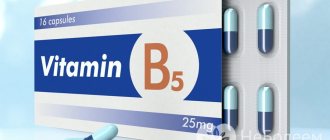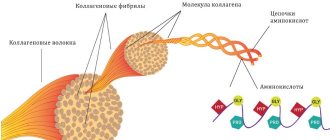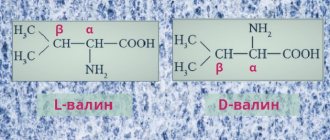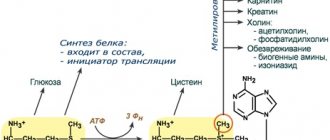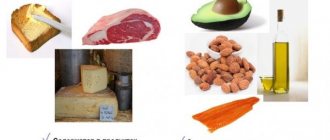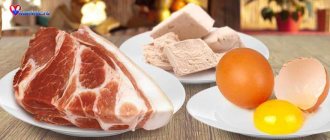Vitamin B4, or choline, is the liver’s first assistant. It protects against damaging factors and prevents the development of non-alcoholic fatty liver disease (NAFLD). In addition, choline helps the liver cleanse the body of toxins, regulates lipid metabolism and reduces the level of “bad” cholesterol (from which atherosclerotic plaques are formed). A person can get the required amount of vitamin B4 from food. To do this, you need to include certain foods in your diet.
From A to E: what vitamins does your liver need? Nutrition should be varied and balanced so that a person, along with food, receives all the vitamins and minerals necessary for normal functioning.
What is choline?
Choline is an essential nutrient ().
This means that it is necessary for the normal functioning of the body and overall human health. Although your liver can produce small amounts of choline, you need to get most of it from your diet.
Choline is an organic, water-soluble compound. It is not a vitamin or mineral.
However, it is often classified as a B vitamin due to its similarities. In fact, this nutrient affects a number of vital body functions.
Choline affects liver function, healthy brain development, muscle contraction, nervous system and metabolism.
Therefore, it must be obtained in sufficient quantities for optimal health ().
Summary:
Choline is an important vitamin-like substance that must be included in your diet to maintain optimal health.
What it is
By the way, this element was discovered back in the 19th century. It was discovered during a study of animal bile. That is why it received the name “choline” (from the Greek choly - “bile”). And the importance of B4 for the human body was realized only in the 30s of the last century.
It is a microelement that performs the following functions:
- supports the health of the reproductive system;
- reduces homocysteine and protects the heart;
- improves the functioning of the digestive tract;
- normalizes insulin levels;
- prevents premature aging of the body;
- protects against the development of Alzheimer's disease and senile dementia.
This vitamin-like substance is essential for liver function and normal brain and nervous system development. B4 is also important for muscle movement, it supports healthy metabolism and increases energy.
In food it is often present in the form of phosphatidylcholine. This compound can be found in a variety of foods that contain certain fats.
Performs many functions in your body
Choline plays an important role in many processes in your body, such as:
- Cell structure : It is essential for the production of fats that maintain the structural integrity of cell membranes ().
- Cell signaling : It is involved in the production of compounds that act as second messengers.
- Fat transport and metabolism : It is important for the production of a substance necessary to remove cholesterol from the liver. A lack of choline can lead to a buildup of fat and cholesterol in your liver (,).
- DNA Synthesis : Choline and other vitamins such as vitamin B12 and folate help in a process that is important for DNA synthesis.
- Nervous System Health : This nutrient is essential for the production of the important neurotransmitter acetylcholine. It is involved in memory, muscle movement, heart rate regulation, and other basic functions.
Summary:
Choline is involved in many different processes, such as cell structure and cell signaling, fat transport and metabolism, DNA synthesis, and nervous system maintenance.
Why do we need choline?
Choline ensures normal metabolism, optimal functioning of the intestines and other internal organs. Without vitamin B4, complete transmission of nerve impulses is impossible.
In addition, choline takes part in a number of important physiological processes:
- Renewal of the cellular structure of tissues after toxic injuries from both toxic substances and pharmaceuticals and drugs.
- Control of metabolism, fat excretion, reduction of cholesterol parameters.
- Prevents the destruction of nerve fiber cells.
- Activates the regeneration of the liver structure.
- Suppresses the formation of intraorgan stones.
- Reduces fatty acid levels.
- Participates in the production of methionine.
- Has a beneficial effect on myocardial function.
- Strengthens pancreatic cells responsible for producing insulin.
- Stimulates reproductive function.
- It has a beneficial effect on the condition of patients with diabetes.
[Video] Medical consultant of NPTsRIZ, geneticist, Ph.D. Irina Yuryevna Saburova talks about the mechanisms of action of choline:
Daily value of choline
Due to a lack of available data, the recommended daily intake (RDI) for choline has not been determined.
However, the Institute of Medicine has established a value for adequate intake (AI) ().
This value is expected to be sufficient for most healthy people, helping them avoid the negative effects of deficiency such as liver damage.
However, recommended intakes vary depending on genetic makeup and gender (, ,).
Additionally, determining choline intake is difficult because its presence in various foods is relatively unknown.
Here are the recommended AP choline values for different age groups ():
- 0 -6 months : 125 mg per day
- 7 -12 months : 150 mg per day
- 1-3 years : 200 mg per day
- 4-8 years : 250 mg per day
- 9 -13 years : 375 mg per day
- 14-19 years : 400 mg per day for women and 550 mg per day for men
- Adult women : 425 mg per day
- Adult men : 550 mg per day
- Breastfeeding women : 550 mg per day
- Pregnant women : 450 mg per day
It is important to note that choline requirements may vary from person to person. Many people may need less choline, while others need more of this nutrient ().
In one study of 26 men, six developed symptoms of choline deficiency even with adequate intake ().
Summary:
Adequate intake of choline is 425 mg per day for women and 550 mg per day for men. However, the requirements for this nutrient may vary depending on the individual.
What other foods contain choline?
Meat products [6], [7]
| Name | A portion | Choline content in mg | Calorie content | Protein content, g | Cholesterol level, mg |
| Beef liver, fried | 100 g | 418 | 175 | 27 | 381 |
| Pork ham (cured) | 100 g | 119 | 548 | 36 | 107 |
| Lean pork shoulder (fresh, cooked) | 100 g | 111 | 248 | 32 | 114 |
| Beef tongue (stewed) | 100 g | 155 | 284 | 19 | 132 |
| Chicken liver (fried) | 100 g | 327 | 172 | 26 | 564 |
| Turkey (cooked) | 100 g | 84 | 157 | 30 | 69 |
| Beef loin (lean, cooked) | 100 g | 117 | 249 | 31 | 67 |
Dairy and egg products
| Name | A portion | Choline content in mg | Calorie content | Protein content, g | Cholesterol content, mg |
| Raw egg yolk | 1 piece (17 g) | 116 | 54 | 3 | 210 |
| Poached egg | 1 piece (50 g) | 100 | 71 | 6 | 211 |
| Fried egg | 46 g | 125 | 90,2 | 6 | 210 |
| Omelette | 100 g | 190 | 167 | 11 | 352 |
| Cream cheese, low fat | 100 g | 65 | 105 | 16 | 12 |
| Powdered milk, skimmed | 100 g | 169 | 362 | 36 | 20 |
Fish and seafood
| Name | A portion | Choline content in mg | Calorie content | Protein content, g | Cholesterol content, mg |
| Red caviar | 100 g | 491 | 252 | 24 | 588 |
| Salted cod | 100 g | 291 | 290 | 63 | 153 |
| Smoked haddock | 100 g | 96 | 117 | 25 | 78 |
| Atlantic herring, pickled | 100 g | 95 | 262 | 14 | 13 |
| Rainbow trout, raw | 100 g | 65 | 138 | 21 | 59 |
| Oysters, raw | 100 g | 65 | 68 | 7 | 53 |
| Salmon, wild, raw | 100 g | 94 | 146 | 22 | 45 |
| Perch, raw | 100 g | 65 | 91 | 19 | 90 |
Cereals and legumes
| Name | A portion | Choline content in mg | Calorie content | Protein content, g | Cholesterol content, mg |
| Quinoa, raw | 170 g (1 cup) | 70 | 626 | 24 | 0 |
| Amaranth, raw | 193 g (1 cup) | 135 | 716 | 26 | 0 |
| Egg noodles, dry | 38 g (1 cup) | 29,9 | 146 | 5 | 32 |
| Toasts | 100 g | 92 | 316 | 11 | 0 |
| Soybeans, mature, raw | 100 g | 116 | 446 | 37 | 0 |
| Split peas, ripe, raw | 100 g | 95 | 341 | 25 | 0 |
| Wheat bran, raw | 100 g | 74 | 216 | 16 | 0 |
Fruits and vegetables
| Name | A portion | Choline content in mg | Calorie content | Protein content, g | Cholesterol content, mg |
| Shiitake mushrooms, dry | 100 g | 178 | 260 | 8 | 0 |
| Sun-dried tomatoes | 100 g | 105 | 257 | 14 | 0 |
| Carrots, dry | 100 g | 72 | 341 | 8 | 0 |
| Bananas, fresh | 1 PC | 11,6 | |||
| Orange, fresh | 1 PC | 15,5 | |||
| Apple, raw | 1 PC | 7,6 | |||
| Boiled potatoes in skins | 1 cup | 10,5 | |||
| Carrots, raw, grated | 1 cup | 1 | |||
| Broccoli, boiled | 1/2 cup | 31,3 |
Deficiency is harmful but rare
Choline deficiency can cause harm, especially to your liver.
One small study of 57 adults found that 77% of men, 80% of postmenopausal women, and 44% of premenopausal women experienced liver and/or muscle damage after switching to a choline-deficient diet ().
Another study noted that when postmenopausal women switched to a choline-deficient diet, 73% developed liver or muscle damage ().
However, these symptoms disappeared when they started getting enough choline.
Choline is especially important during pregnancy, as low intake may increase the risk of neural tube defects in unborn children.
One study found that higher choline intake around the time of conception was associated with a lower risk of neural tube defects ().
Additionally, low choline intake may increase the risk of pregnancy complications. These include preeclampsia, premature birth and low birth weight ().
Although most modern people do not get enough choline from food, actual deficiency is rare.
Summary:
Choline deficiency is associated with liver and/or muscle damage. Low intake during pregnancy is associated with complications.
Deficiency Symptoms
Most people do not get enough B4, despite the presence of sources in their diet. This happens because some types of choline are hardly absorbed by the body. Research shows that the average person does not have the levels of B4 they need on a daily basis (1).
Most likely, this is due to genetic factors - when people have an increased need for choline. Researchers are still debating how much B4 you should consume daily. So far they have not come to an agreement, since the needs are too individual. Therefore, the recommendations for use given in the table below are rather arbitrary.
Symptoms of element B4 deficiency:
- fatigue, low energy level;
- memory loss, decreased cognitive abilities;
- muscle pain;
- nerve damage;
- mood swings, frequent disorders;
- sleep disorders.
With age, with B4 deficiency, cognitive abilities decrease. This is manifested by memory loss, Alzheimer's disease and dementia. Adequate levels of choline support neurotransmitters (2).
ARTICLES ON THE TOPIC:
- Why does our body need vitamin B12 and what foods to eat to…
- Why is vitamin B5 (pantothenic acid) needed and in which products is it found...
- Vitamin B1 (thiamine) - why our body needs it and in what products...
Some people are at risk of deficiency
Although choline deficiency is rare, some people are at increased risk ():
- Long-term endurance athletes : Choline levels decrease during long-term endurance exercise, such as marathon running. It is unclear whether supplementation improves athletic performance (, ).
- High Alcohol Intake : Alcohol can increase your choline requirement and your risk of deficiency, especially at low intake (, ).
- Postmenopausal women : Estrogen helps produce choline in the body. Because postmenopausal women tend to have lower estrogen levels, they may be at greater risk of deficiency (, ).
- Pregnant women : The need for choline increases during pregnancy. Most likely, this is due to the fact that the unborn child needs choline () for development.
Summary:
People at increased risk of choline deficiency include athletes, those who drink a lot of alcohol, postmenopausal women and pregnant women.
Lack and excess of vitamin B4 in the body
A decrease in the body's supply of this vitamin is caused by limiting its intake from food, the introduction of substances that utilize methyl groups (nicotinic acid), as well as a deficiency of cyanocobalamin and folic acid.
Choline deficiency in the body leads to the following consequences:
- development of fatty liver infiltration,
- degeneration of the renal tubular apparatus,
- growth retardation.
Lack and deficiency of vitamin B4 threatens a real breakdown of the psyche, as happens in very old people, and this can happen even before the age of 40. The mechanism of this breakdown is not difficult to understand: with choline deficiency, cholesterol is oxidized, combines with protein waste and clogs the “passages” in cell membranes, so the most necessary substances cannot enter the cell - metabolic processes slow down greatly.
The brain tries to transmit signals, but the channels through which they should pass are also clogged, and the person loses the ability to think clearly, forgets the most basic things, quickly gets tired, becomes depressed and “depressed.” At the same time, sleep is disturbed, and brain cells and nerve endings begin to quickly die: the more cholesterol accumulates in the blood, the faster this process occurs.
Since, with a lack of choline, entire colonies of cholinergic neurons die off, eventually there is a danger of incurable Alzheimer's disease, which is accompanied by absolute loss of memory and personality disintegration. Modern neurophysiologists are of the opinion that a significant proportion of people over 40 years of age in Western countries have already come close to this disease.
- Forgetfulness, absent-mindedness
- Depression, state of fear
- Irritability
- Insomnia
- Cardiac arrhythmia
- Circulatory disorders
- Headache
- Noise in ears
- Constipation
This B vitamin is produced in the intestines with the participation of the proteins methionine, serine, as well as vitamin B12 and folic acid. Methionine and serine are found in large quantities in meat, fish, poultry, eggs and cheese; vitamin B12 - in liver, fatty meat, fish and dairy products; folic acid - in green salad and brewer's yeast.
Since choline is mainly synthesized during its own metabolism, its content in foods is not indicated. In the same way, no recommendations are given about the body's needs for it. It should be assumed that the daily dose should be up to 4 grams, with severe stress - up to 6 grams, and only one fifth of this amount enters the body with food.
You should not use lecithin for a long time or in large doses as a replacement for choline. This can cause vitamin B6 deficiency, causing nausea, diarrhea and bad breath.
Best Sources of Choline
Choline can be obtained from a variety of foods and supplements.
What foods contain large amounts of choline?
Food sources typically contain choline in the form of phosphatidylcholine, which is also part of the lecithin group.
The foods richest in choline are ():
- Beef liver : 1 slice (68 grams) contains 290 mg.
- Chicken liver : 1 slice (68 grams) contains 222 mg.
- Eggs : 1 large hard-boiled egg contains 113 mg.
- Fresh cod : An 85-gram serving contains 248 mg.
- Salmon : A 110g fillet contains 62.7mg.
- Cauliflower : A 62-gram serving contains 24.2 mg.
- Broccoli : A 78-gram serving contains 31.3 mg.
- Soybean oil : 1 tablespoon (15 ml) contains 47.3 mg.
Since one egg accounts for about 20-25% of your daily requirement, two large eggs provide almost half of the required amount ().
Additionally, one 85-gram serving of beef liver or kidney can satisfy a woman's daily requirement and most of a man's requirement ().
Choline supplements
Lecithin is a widely used dietary supplement containing choline. However, lecithin tends to contain only 10-20% phosphatidylcholine.
Phosphatidylcholine can also be taken in tablet or powder supplement form, however choline makes up only about 13% of phosphatidylcholine's weight ().
Other forms of supplements include Choline Chloride, Citicoline, Alpha GPC, and Betaine.
If you are looking for a supplement, Citicoline and Alpha GPC tend to have higher choline content per unit weight. They are also easier to digest than others.
Some sources claim that choline in dietary supplements can reduce body fat, but there is no evidence to support these claims.
Summary:
Rich food sources of choline include beef liver, eggs, fish, nuts, cauliflower and broccoli. Choline can also be taken as a supplement (drug), of which Citicoline and Alpha GPC seem to be the best.
Natural provision of daily needs B4
Choline is synthesized in a small amount in the body, but this is not enough to ensure metabolic processes and the element must be supplied from the outside. The main source of choline is animal products. By consuming eggs, liver, fish and dairy products, you can avoid hypovitaminosis B4. To maintain health, an adult needs to receive about 500 mg of the vitamin daily. The physiological need for the element increases under certain conditions:
- stress;
- alcohol consumption;
- liver and kidney diseases;
- physical activity
When compiling a menu to cover daily needs, you need to take into account the method of preparing the dish. When cooking, up to 25% of the substance is lost, and when baking, about 5-7%.
But when compiling your daily diet, you should not abuse animal food. The menu should include plants, vegetables and fruits. The main sources of B4, in addition to large amounts of choline, contain cholesterol and a monotonous diet can negatively affect the condition of blood vessels.
10 Main Sources of Choline
Choline deficiency is manifested by memory loss, psychoemotional disorders, obesity, chronic fatigue, aversion to fatty foods and diarrhea. If vitamin B4 deficiency is detected, you need to eat products containing the vitamin in large quantities:
- beef liver – 418 mg;
- pork liver – 370 mg;
- chicken egg – 294 mg;
- soy – 270 mg;
- legumes – 200 mg;
- turkey meat – 139 mg;
- sour cream – 124 mg;
- chicken meat – 118 mg;
- cod fish – 80 mg;
- cauliflower – 44 mg.
The list shows the content of vitamin B4 per 100 g. The list of which foods contain the most choline includes not only animal foods, but also plants. By combining foods, you can create a balanced menu to replenish vitamin deficiency.
Nature's Way, Choline, 500 mg, 100 Tablets
from 722 ₽
More details
Meat products
The leaders in B4 content are beef offal; slightly less vitamin is found in the meat of animals and poultry. A table showing which meat products contain choline will help you choose the required portion to meet your daily requirement for B4.
| Name | Amount of choline in mg per 100 g |
| Cattle liver | 418 |
| Pork liver | 370 |
| Chicken liver | 198 |
| Turkey | 139 |
| Duck liver | 122 |
| Duck meat | 118 |
| Broiler chicken | 117 |
| Rabbit | 116 |
| Veal | 108 |
| Mutton | 87 |
| Chicken meat | 77 |
The choline content of foods is indicated before preparation. When calculating the amount of a substance, you need to take into account how the food was prepared: fried, boiled or stewed. This will allow for possible losses of B4 during cooking.
Dairy
Milk and products made from it are also a source of choline. But, compared to meat products, milk and its derivatives contain a relatively small amount of the vitamin.
| Name | B4 content in mg per 100 ml |
| Powdered milk | 169 |
| Sour cream | 124 |
| Cream cheese | 65 |
| Cottage cheese | 46 |
| Kefir | 43 |
| Whole milk | 23 |
As can be seen from the table, dairy products, with the exception of sour cream and milk powder, do not contain very much vitamin and cannot meet the daily requirement. These products are recommended to be consumed in combination with other foods.
Eggs and dishes made from them
Choline is found in large quantities in eggs. The yolk is especially rich in the element. If you have hypovitaminosis B4, eating egg yolks will help your brain work, get rid of the constant feeling of fatigue and normalize your intestines. Egg dishes are no less healthy.
| Product | Amount of vitamin in mg per 100 g |
| Egg powder | 912 |
| Yolk | 806 |
| Quail egg | 511 |
| Chicken eggs | 295 |
| Fried eggs | 292 |
| Omelette | 190 |
| Poached egg | 100 |
Analyzing the information from the table, we can conclude that eggs and dishes made from them are a natural source of the vitamin. The use of these products will not only provide the daily requirement, but also eliminate the signs of vitamin deficiency.
Solgar, Choline/Inositol, 500 mg/500 mg, 100 Veggie Caps
from 1,064 ₽
More details
Seafood and fish
When listing which foods contain vitamin B4, you need to mention seafood and freshwater fish.
| Name | How much choline does it contain in mg per 100 g? |
| Red caviar | 491 |
| Cod | 291 |
| Haddock | 96 |
| Herring | 95 |
| Salmon | 94 |
| Trout | 65 |
| Oysters | 65 |
| Perch | 65 |
Sea fish and caviar are the richest in vitamins. A small amount of this product allows you to meet the needs of the human body in B4.
Legumes and grains
Those who have abandoned animal foods in favor of vegetarianism should pay attention to plant foods rich in choline.
| Name | How much in mg B4 per 100 g |
| Soybeans | 284 |
| Split peas | 207 |
| Oats (grains) | 111 |
| Barley | 111 |
| Wheat | 96 |
| Lentils | 95 |
| Rice (cereal) | 83 |
| Buckwheat | 62 |
If you eat only plant foods, you should definitely include whole grain cereals and soybeans, which contain a lot of vitamins, in your menu.
Vegetables, mushrooms and fruits
Mushrooms, some vegetables and fruits are rich in choline. This food should definitely be included in your diet.
| Products | Amount of B4 in mg per 100 g |
| Shiitake mushrooms (dried) | 178 |
| Sun-dried tomatoes | 105 |
| Dried carrots | 72 |
| Fresh cabbage | 70 |
| Boiled potatoes | 66-70 |
| Broccoli | 40 |
| Spinach | 20 |
| Avocado | 14 |
| Fresh carrots | 12 |
| Orange | 8,5 |
| Fresh tomatoes | 6,8 |
| Cucumber | 6 |
| Grape | 5,7 |
The type of product affects how much vitamin is in vegetables or fruits: sun-dried tomatoes and dried carrots contain several times more B4 than fresh vegetables. It is also worth paying attention to the fact that vegetables contain more B4 than citrus fruits or avocados.
Source Naturals, Inositol & Choline, 800 mg, 100 Tablets
from 921 ₽
More details
Spices, nuts and seeds
Many people know that seeds and nuts are a storehouse of vitamins, but few have thought that spices can also be a source of B4.
| Name | Choline content in mg per 100 g |
| Peanut | 170 |
| Mustard seed | 120 |
| Parsley | 97 |
| Coriander | 97 |
| Nutmeg | 91 |
| Pistachios | 91 |
| Flax seed | 79 |
| Pumpkin seeds | 65 |
| Pine nuts | 55,8 |
| Sunflower seeds | 55 |
| Basil | 53 |
| Sesame | 25 |
By combining choline-containing foods, you can ensure that you get the required doses of B4 into your body every day. There is no overdose when consuming foods, but you should still not overuse eggs or liver - the food should be balanced.
PS If you are trying to ensure that you get the required amount of choline from food, then tell us how you create your menu. What food do you prefer?
Impact on Heart Health
Higher choline intake is associated with a reduced risk of heart disease ().
Folate and choline help convert the amino acid homocysteine into methionine.
Thus, a deficiency of any nutrient can lead to the accumulation of homocysteine in the blood.
Elevated levels of homocysteine in the blood are associated with an increased risk of heart disease and strokes ().
However, the evidence is mixed.
Although choline may lower homocysteine levels, the relationship of choline intake to the risk of heart disease is unclear (, , , , , ).
Summary:
Choline may help reduce the risk of heart disease by lowering homocysteine levels. However, the evidence is mixed.
Effect on your brain
Choline is necessary for the production of acetylcholine, a neurotransmitter that plays an important role in regulating memory, mood and intelligence ().
It is also essential for the process by which DNA synthesis occurs, which is important for brain function and development ().
Therefore, it is not surprising that choline intake is associated with improved brain function.
Memory and brain function
Large observational studies have linked choline intake and blood levels to improved brain function, including improved memory and information processing (, ).
Taking 1000 mg per day resulted in improvements in short- and long-term verbal memory in adults aged 50-85 years who had poor memory ().
In a 6-month study, phosphatidylcholine supplementation in people with early-stage Alzheimer's disease modestly improved memory in one small subgroup ().
However, other studies in healthy people and people with dementia have found no effect on memory (, , ).
Brain Development
Some animal studies suggest that taking choline supplements during pregnancy may improve fetal brain development (, , ).
However, only a few studies have been conducted in humans.
One observational study of 1,210 pregnant women found that choline intake was not associated with mental performance in their children at 3 years of age ().
However, the same study found that higher choline intake in the second trimester was associated with better visual memory performance in the same children at age 7 ().
In another study, 99 pregnant women took 750 mg of choline per day from 18 weeks of pregnancy until three months after pregnancy. They did not experience any improvements in brain function or memory ().
Mental health
Some evidence suggests that choline may play a role in the development and treatment of some mental disorders.
One large observational study linked lower blood choline levels to a higher risk of anxiety—but not depression ().
These levels are also used as an indicator of certain mood disorders, and choline supplements are sometimes used to treat bipolar disorder ().
One study found that choline therapy improved manic symptoms in people diagnosed with bipolar disorder ().
However, there is currently not much research on this issue.
Summary:
Choline may improve memory function, improve brain development, and treat anxiety and other mental disorders. However, the evidence is mixed.
Instructions for use of vitamin B4
Low choline levels negatively affect phospholipid production. In this condition, the release of fatty acids into the blood plasma is impaired. Taking these features into account, the likelihood of thrombosis increases. For liver diseases, 200-300 mg of choline per day is prescribed. This dosage is enough to stimulate the renewal of liver cells and prevent fatty degeneration of its tissues.
When treating traumatic brain injuries, 1000 mg of choline preparations are prescribed parenterally - intravenously, intramuscularly. The therapeutic course lasts from 10 to 20 days. It is acceptable to administer injections 1-4 times a day, depending on the clinical symptoms and condition of the patient. At the end of the main course of treatment, maintenance therapy is prescribed for a period of 4 to 6 months.
Patients with dementia are prescribed choline at a dose of 400 mg three times a day. The treatment program lasts 3-6 months.
Pregnant women are advised to take choline preparations in a dosage of 1000 to 3000 mg per day. This will ensure the normal formation of the child’s central nervous system and his harmonious physical development. The woman is advised to avoid nervous stress. Choline suppresses the activity of the stress hormone cortisol. This serves as additional protection for mother and child from negative conditions.
Other Benefits of Choline
Choline has been linked to the development and treatment of certain diseases.
However, for most of them the connection is not clear, and research is ongoing ().
Liver diseases
Although choline deficiency leads to liver disease, it is unclear whether consumption below recommended levels increases the risk of developing liver disease.
The study, which examined data from more than 56,000 people, found that normal-weight women with the highest choline intake had a 28% lower risk of liver disease than women with the lowest intake of the nutrient ().
The study found no association with liver disease in overweight men or women ().
Another study of 664 people with non-alcoholic liver disease found that lower choline intake was associated with greater disease severity ().
Cancer
Some studies suggest that women who eat plenty of choline may have a lower risk of developing breast cancer (, ,).
One study of 1,508 women found that those who ate a diet high in free choline were 24% less likely to develop breast cancer ().
However, the evidence is mixed.
Other observational studies have found no association with a reduced risk of cancer, but test-tube studies suggest that deficiency may increase the risk of liver cancer (, , ).
On the other hand, higher choline intake is also associated with an increased risk of prostate cancer in men and colon cancer in women (, ).
Neural tube defects
Higher choline intake during pregnancy may reduce the risk of neural tube defects in children.
One study noted that women with higher levels of choline intake during conception had a 51% lower risk of neural tube defect compared to women with very low intakes ().
Another observational study found that pregnant women with the lowest intake were twice as likely to give birth to babies with neural tube defects ().
However, other studies have found no association between maternal choline intake and risk of neural tube defects (, ).
Summary:
Limited evidence suggests that choline may reduce the risk of neural tube defects in children as well as liver disease. However, the effect of choline on cancer is unknown. More research is needed.
Which choline supplement should you choose?
Lecithin. Available in the form of a dietary supplement. Contains 10–20% phosphatidylcholine. Phosphatidylcholine is produced in the form of powder or tablets, in which choline is approximately 13% of the total volume of the drug []. Other vitamin supplements contain choline in the form of chloride, CDP-choline, alpha-GPC and betaine.
Names of drugs and their costs
| Drug name | Volume | Cost in rubles |
| Cholitilin (capsules) | 400 mg | 28 capsules – 890 RUR |
| Gleatser (solution in ampoules of 4 ml) | In 1 ml - 250 mg | 5 ampoules - 520 RUR |
| Choline alfoscerate (solution in ampoules of 4 ml) | In 1 ml - 250 mg | 5 ampoules - 400 RUR |
| Noocholine (solution in ampoules of 4 ml) | In 1 ml - 250 mg | 3 ampoules – 330 RUR |
| Cerepro (capsules) | 400 mg | 14 capsules - 690 RUR |
| Cereton (in capsules or ampoules) | Per capsule - 400 mg in 1 ml - 250 mg | 14 capsules – 590 RUR 5 ampoules - 450 RUR |
| Gliatilin (capsules or ampoules) | Per capsule - 400 mg in 1 ml - 250 mg | 14 capsules – 820 RUR 3 ampoules - 630 RUR |
Excess Choline Consumption May Be Harmful
Consuming too much choline has been linked to unpleasant and potentially harmful side effects.
These include decreased blood pressure, sweating, fishy body odor, diarrhea, nausea and vomiting ().
The maximum daily intake of choline for adults is 3500 mg. This is the highest level of consumption that is unlikely to cause harm.
It is unlikely that anyone could get this amount from food alone. It would be almost impossible to reach this level without taking supplements in large doses.
Summary:
Consuming too much choline has been linked to unpleasant and potentially harmful side effects. However, it is unlikely that you can get that much choline from food alone.
Symptoms of Choline Overdose
- The appearance of a “fishy” odor from the body.
- Vomit.
- Excessive sweating.
- Hypersalivation.
Against the background of excess amounts of choline, the liver experiences a toxic effect. The body activates the production of TMAO, which causes cardiovascular disorders.
Summarize
- Choline is an essential nutrient needed for optimal health.
- It may play a key role in healthy brain function, heart health, liver health, and a healthy pregnancy.
- Although actual deficiency is rare, many people do not get enough of this nutrient.
- To increase your intake, consider eating more choline-rich animal and plant foods such as organ meats, fish, eggs, broccoli and cauliflower.
Tags: Choline
- Related Posts
- Steroids: harm and benefit, application, side effects
- Selenium: benefits and harm to the body, norm, sources, side effects
- Magnesium Supplements: Benefits, Side Effects and Dosage
« Previous entry
Lack and excess of vitamin B4 in the body
Vitamin B4 performs the following functions in the human body:
- creates conditions for the full functioning of the nervous system (takes part in the synthesis of acetylcholine, a substance that is one of the most important transmitters of nerve impulses);
- prevents destruction and damage to cell membranes;
- helps normalize emotional state;
- improves memory, allows you to preserve it until old age;
- activates mental activity;
- participates in the synthesis of one of the essential amino acids – methionine;
- is one of the links in carbohydrate metabolism;
- maintains normal insulin levels in the body;
- is one of the hepatoprotectors - it has a beneficial effect on the functioning of the liver, protects it from negative external influences and prevents its fatty infiltration;
- normalizes lipid metabolism in the body;
- helps increase the absorption of certain fat-soluble vitamins;
- strengthens the myocardium, lowers homocysteine content, thereby preventing the development of a number of cardiac diseases;
- promotes normal growth processes;
- takes part in the synthesis of phospholipids - substances that regulate the concentration of cholesterol in the blood and prevent the development of atherosclerosis.
Of particular importance is that choline itself is part of certain fat-like substances and lipoproteins, in particular cholesterol. Lipoproteins are fat molecules enclosed in a protein shell. Only in this form can they be transported in the blood, since water-insoluble fat would otherwise be deposited on the walls of blood vessels.
In interaction with other substances (for example, with inositol), this vitamin ensures that cholesterol remains “edible” for 70 trillion cells in the body. If there is a choline deficiency, cholesterol would continue to circulate in the blood. At the same time, its concentration could increase to a dangerous level, since cholesterol molecules themselves are not absorbed by cells.
At the same time, cells really need cholesterol. It is an integral part of the protective cell membrane, and in nerve cells it makes up 50% of the sensitive myelin layer of membranes. The protective covering of brain cells and nerves is oily and moist. This vitamin and substances such as vitamin C are of great importance for maintaining its constant consistency.
The worst thing is that the microscopic channels through which thoughts, sensations and other brain signals are transmitted are blocked. A person suddenly finds himself unable to formulate thoughts clearly, and experiences mental fatigue, forgetfulness, depression, or depression. Despite increased fatigue, he has difficulty falling asleep. The death of brain cells and nerves occurs in proportion to the accumulation of cholesterol in the blood.
